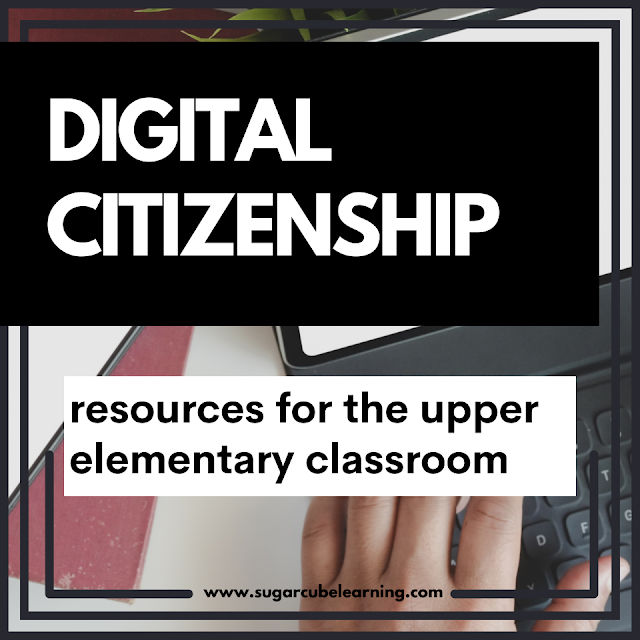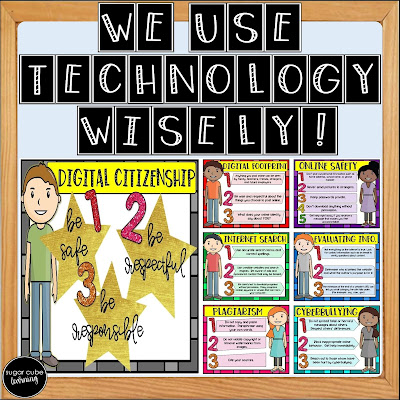Before our students are even born, they have a digital footprint. As parents and caregivers share every milestone on social media, do our students know what is appropriate to share or take part in once they are given a chance?
Digital citizenship is making sure students are aware of what they are creating and sharing online. It is important for them to understand that their actions online have consequences, good and bad. Teaching them to leave reputable digital footprints, while staying safe and being respectable online, should not be an elective class, but a part of everyday class discussions. ("Will posting this make you proud?") Not teaching digital citizenship skills to our students will leave them ill-prepared for the pressures, indecency, and misinformed information that can be found online. Let's prepare our students to not only be able to face and overcome these challenges; but also present themselves in a respectable manner when conversing and engaging in the online world.
How can you weave digital citizenship throughout your curriculum? There are many tools to be found online and in bookstores. I will highlight a few of my favorites that I think work well for the upper elementary classroom. (Please note: This post contains affiliate links.)
Google has designed an online safety curriculum that aligns to the ISTE standards and integrates easily with Google Classroom. Your students will explore digital safety topics through an online gaming course called Interland. Kids can earn certificates and badges along the way!
2. BrainPop
BrainPop is known for its quirky videos on a wide range of topics. Kids love Tim and his robot friend answering all of their intriguing questions. As a teacher you'll find activities, quizzes, and NewsELA nonfiction articles accompanying each digital citizenship video lesson.
Common Sense Media has a plethora of resources for teachers concerning online safety. Digital Passport is a series of games that approach topics such as digital footprints, cyberbullying, and effective online searches. Students earn badges as they complete each challenge!
4. Digizen
Digizen has tips for parents, teachers, and students about navigating the web. It has short films, videos, and games to help present hot topics in digital citizenship skills. Students can even create their own "digizen" character to use in their online interactions.
Here you will find many cartoon-like videos to help start conversations on important issues that students face online and how they can get help. They are sorted by grade levels, so browse through them and find the issues that are currently facing your students.
1. Bully by Patricia Polacco examines how cyberbullying affects tweens via social media (Facebook). Aimed at upper elementary, Ms. Polacco's books are always visually stimulating and thought provoking.
2. But I Read It On the Internet by Toni Buzzeo is a tale of a quirky librarian that attempts to help students realize that not everything they read online is true.
3. Cell Phoney by Julia Cook answers the question most caregivers dread, "When can I get a cell phone?" Students will learn about the responsibility of having a device, as well as suggestions on how to stay safe when using it.
4. Nerdy Bird Tweets by Aaron Reynolds is a story about using social media responsibly, and what happens when one doesn't. There are many conversation starters that can be incorporated into the classroom such as exclusion, "popular vs. nerdy" kids, time management, and staying healthy.
4. Nerdy Bird Tweets by Aaron Reynolds is a story about using social media responsibly, and what happens when one doesn't. There are many conversation starters that can be incorporated into the classroom such as exclusion, "popular vs. nerdy" kids, time management, and staying healthy.
5. The Technology Tail by Julia Cook reinforces the necessity of being kind in words and actions when posting online. Students will learn about how one's digital footprint can affect future opportunities.
6.What Does It Mean To Be Safe? by Rana DiOrio encourages conversations about how to keep oneself safe in various locations and situations, including online.
Looking for even more digital citizenship reference tools? Check out this bulletin board set that offers quick reminders about being safe and responsible online. If you're short on wall space, the posters also work great printed at 50%, laminated, and placed on rings for each computer lab station.






